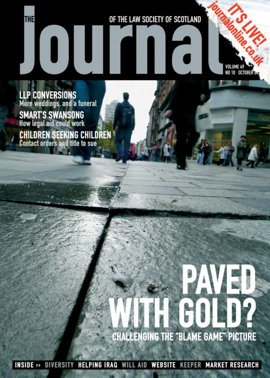Steering clear

For those who have occasionally wondered about motorists and random police checks, matters have been clarified by the case of Miller v Bell 2004 GWD 26-564, which involves a conviction for a contravention of section 5 of the Road Traffic Act 1988 following the driver being stopped in the course of a police random check on vehicles. It might have been thought that such checks, involving the compulsory stopping and speaking to of persons whom the officers had no reason to believe had committed an offence, were not legal. The appeal court however had to look at the terms of section 163 of the Act, which requires that any person driving must stop if required to do so by a police officer in uniform. Accordingly anything following from this legal requirement, such as the smelling by an officer of drink on the driver’s breath may lead to the actions normal in such a circumstance.
An attempt was made in the appeal to argue that the meaning given to section 163 in the case of Stewart v Crowe 1999 SLT 899 was incompatible with article 8(2) of the European Convention. The court however held that construed as it was in Stewart, the section represented a necessary and proportionate response to the prevention of crime. The court held too that the very random nature of the checks was indicative that they were not capricious.
Another road traffic case, but about sentence, is Scally v Williams 2004 GWD 23-511 in which, put shortly, the sentencer had imposed a longer period of disqualification because of the fact that the appellant’s limited means prevented him being fined more. The court however did observe that it should not be assumed that it would hold this approach unsound in every case. It is clear, I think, that disqualification serves two distinct purposes, protection of the public and punishment of the offender. It is likely that the first consideration will be uppermost in almost all cases, as is evidenced by the courts’ consistent refusal over the years to allow an accused to “buy” his or her way out of a longer disqualification by the acccepting of a larger than normal fine.
Moorov. Is there much more to be said? I expect so, as legal doctrines are always subject to development and modification. And so to Beaton v HMA 2004 GWD 24-517. So far as the strictly Moorov aspect of the case is concerned, the appeal court emphasised again that it is for the trial judge to consider whether or not there is enough in law to allow the case to go to the jury on that basis and observed that in this case there had not been. Accordingly it seems that if the trial judge is satisfied that there could be corroboration via Moorov, he or she should tell the jury that that is the case while emphasising that the matter is still one for them, the vital question being whether there is sufficient in the evidence which they accept to allow them to conclude that the two or more crimes under consideration are part of a course of criminal conduct systematically pursued. Beaton, it should be understood, is about identification: in Moorov itself it will be remembered that identification was not a problem. The question was whether the evidence of one witness to a crime committed by the accused could be corroborated by a different witness speaking to a similar crime on a different occasion. In Beaton, it is noteworthy that the appeal court held that there had also been a material misdirection in that the sheriff had not given adequate directions to the jury as to how they should approach the critical question of identification, and among other things had not pointed out matters which the jury might have found it helpful to consider. As most judges say at some point, I suppose, “these are matters entirely for you, ladies and gentlemen,” such directions must be given with care, lest the court give the impression that the jury should take a certain view, but it is clear that depending on the type of case and the state of the evidence there will be times when an analysis of the strengths and weaknesses of prosecution and defence cases will be required. But will it always have to be prefaced with the words “you may think, ladies and gentlemen”? I expect so.
Still on credibility, although coming at it from a somewhat different angle is the case of Mackay v HMA 2004 GWD 26-553. This arose out of the refusal at a preliminary diet of an application under section 275(1) of the 1995 Act to have admitted evidence which was intended to show that one of the complainers, a boy aged between three and six at the time of the alleged offences, was, broadly speaking, unreliable and prone to making up stories. The appeal was refused, the court holding that the application did not satisfy the terms of section 275, being concerned with general evidence rather than specific and did not involve anything to do with matters of the type with which the accused was charged. It was pointed out that the evidence sought to be adduced was quite different from expert evidence given about some sort of recognised medical, psychiatric or psychological condition which could account for a witness giving an untrue account. A distinction was also drawn with the situation in which it is competent to put to a witness that he had been convicted of an offence, that being an objective and verifiable fact.
Turning to procedure and the Crown’s duty at a trial in relation to the defence, Sinclair v HMA 2004 GWD 26-503 is unusual on its facts. There a witness in evidence said rather more than she had said in the first of her two police statements. The defence did not know this and at the appeal argued that these statements should have been disclosed to the defence, and that if they had been a different line of cross examination would have been adopted. It was argued that the court should recognise a limited extension to the principles set out in McLeod, Petitioner 1998 SLT 233, to the extent that the Crown had a duty to produce police statements of Crown witnesses as a matter of course. It was held that there was no duty on the Crown to produce such statements in advance of the trial as a matter of course. Further it was held that there was no miscarriage of justice arising out of the Crown’s not producing the statements in the course of the trial. It was noted that the defence had not requested that this be done, and observed that if such a request had been made it would no doubt have been acceded to.
Smith v HMA 2004 GWD 28- 591 is something of an unusual case but worth a look. It deals with the appropriateness of a sentence on someone who, put shortly, pleaded guilty before a jury trial started to two charges of failing to appear at sittings of the High Court. He was acquitted on the other charges, on which he went to trial. The sentencing judge took the view that these were pleas of expediency designed to keep the knowledge of the failure to appear from the jury. The appeal court disapproved of this approach, holding that an accused was entitled to plead guilty at any time and if that meant that the jury did not hear about the facts and circumstances giving rise to those charges, the appellant should not be penalised for this. The sentences imposed were reduced accordingly. The appeal court also had some things to say about the preparation and conduct of criminal appeals and the standards to be expected from those involved. It is suggested (by me) that all practitioners might profitably read, mark, learn and inwardly digest.
In this issue
- Citizenship, society and solicitors
- The well unfair state
- Litigation nation
- Best medicine
- Take a deep breath
- What title?
- Walk this way?
- Know your strategy
- e-quilibrium?
- The researchers
- Rights out of anarchy
- Political correctness or positive change?
- Steering clear
- How far can a board go?
- Major role for new tribunal
- The race is on (again)
- Planning a superhighway
- Website reviews
- Book reviews
- Single survey's lonely heart
- In harmony
- Clearing the path






